
The Effects of Cleaning Image Rebranding and Perception? A United Kingdom Context
The role cleaning plays in the societal life and the economic contribution has been undoubtedly remarkable. The coronavirus (COVID) pandemic in 2019 further highlighted the fervent support the cleaners invested in essential industries namely, health and social care, food manufacture, education, transport, and key public services. However, there was an outcry from the All-Party Parliamentary Group for the cleaner’s status to be reviewed by central governments and upgraded to “Key Worker”. This was due to the vital work they were doing in tackling the pandemic and help for the UK economy recover (Tansley, 2021). Conversely, the stigma attached to the cleaning profession has remained a longstanding issue for decades. The challenges of being undermined by their work and the general demeaning notion of being frequently referred to as ‘unskilled’ has reinforced worthlessness, and the job they carry out is deemed as unimportant (Lucio and McBride, 2020). The cleaning image and perception require an overall rebrand to attract people to pursue a lifelong career and take pride in what they do.
Research Problem
For many years, despite the crucial role cleaners are playing the stigma associated with being a cleaner and the challenges of being deemed as an unskilled worker and low-paid has developed a demeaning mentality. This continued stigmatization has led to the cleaning profession being seen as a non-career option, high turnover, job dissatisfaction, and challenges with job retention. The industry contributes significantly to the economy with over 1.4 million people employed. This study critically examined the effects of the stigma associated with being a cleaner, and the benefits of rebranding the image and perception to the industry and frontline cleaners.
Aim
The research aims to understand the effects of cleaning image rebranding in the UK.
Objectives
- To investigate the impact of cleaning image rebranding on the reputation of companies in the UK.
- To explore the perception of cleaners towards image rebranding of cleaning companies in the UK.
- To examine the effects of image branding and the impact they have on the financial and operational performance of cleaning in the UK.
Literature Review
The global consensus to acknowledge the pivotal role played by the cleaners, particularly during the pandemic is no longer debatable. This fact then suggests that employees in the cleaning industry are valued both internally and externally. According to Amit (2022), organizations must first consider their employee branding and image to create the required motivation for a successful implementation of their business strategy. The cleaning industry is purely people driven and orientated; it follows that the image of this human capital is positively promoted through internal marketing. Thus, employees are treated symmetrically as customers and in turn, the organization and its external customers will benefit overall. This notion is consistent with the quote by Richard Branson that “Clients do not come first. Employees come first. If you take care of your employees, they will take care of the clients.’’ (Branson, 2020).
Lowe (2020) argued that the overall employee image will improve through the promotion of positive cultures where people trust and treat each other with respect. Additionally, building a vibrant workplace with an inclusive leadership approach. This idea creates an environment where employees feel motivated and encourage to commit and participate in continuous improvement. Furthermore, Sykes et al. (2014) highlighted the demeaning challenges faced by the cleaners. Workers did not feel they were afforded equal dignity and respect others are shown at workplaces. In some instances, they are referred to as invisible and the lowest of the lowest. Disappointingly, these treatments emerge from junior to senior management, members of the public, clients, and other stakeholders. The negative treatment of cleaners was validated in the article (Zambas, 2023) where cleaning was ranked the second worst job out of thirty.
The stigma attached to being a cleaner was further highlighted in their studies(Rabelo &Mahalingam, 2018) where cleaners experienced invisibility at work. This issue was owing to the fact that cleaners do not want to be seen, seldomly recognized or acknowledged by the customers, and felt unappreciated. Hatton (2017) dissected the longstanding concept of invisible work and offered a new analytical tool to untangle the systems that produce and replicate hindrances for workers. Findings by Lucio and McBride (2020) revealed the stigma and feeling of cleaners being undervalued and unappreciated. The review of various kinds of literature and publications revealed a salient gap in previous studies. The problems i.e., the stigma associated with being a cleaner, negative image, and perception have been extensively researched. However, the advancement of practical solutions to the problems has been to some degree insufficient. The provision of possible solutions by the researcher is described in the conceptual framework shown in Figure 1. This encompasses the use of internal and external influence as a tool to advance a practical solution to the problem of poor image and rebranding the perception of being a cleaner.
In a fast-growing critical industry with enormous potential and importance such as the cleaning industry, it is essential that its relevance to society is first recognized, preserved, and protected. However, this undeniably requires a collaborative effort and influence from all stakeholders to attain the desired success. As illustrated in Figure 1, external influence from local and central governments including financial institutions will undoubtedly add value to the resolution being sought in addressing the cleaning image and stigma. Correspondingly, internal influence is pivotal given the direct connection and being at the forefront of the longstanding problems. Bugg (2022) posits the importance of perceptual change in the UK contract cleaning and called on the UK government to maintain the newly created All-Party Parliamentary Group (APPG) representing the interests of the cleaning and hygiene industry in the UK Parliament.
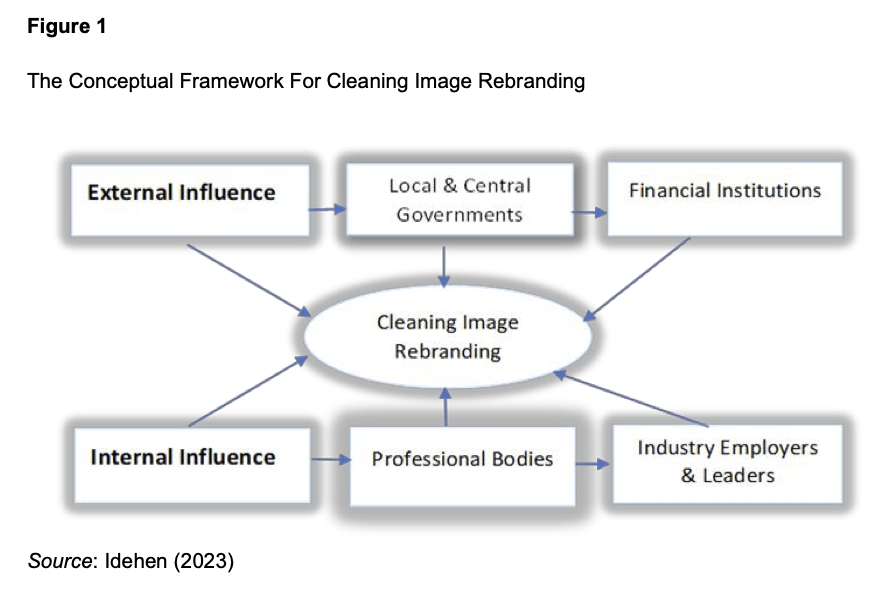
External Influence
Central and Local governments
Demands have been growing for the government to legally recognize the cleaning profession as key workers’ status. Highly reputable bodies in the cleaning industry such as, the British Cleaning Council (BCC), British Cleaners Association (BCA), and British Institute of Cleaning Science (BICS) are now lobbying the UK government to uplift the cleaning status to a key worker.
The priceless sacrifices invested by the cleaners during the pandemic were cited as the key justification for the government to consider their requests (Bugg (2022). The government’s participation in the bid to rebrand the cleaning image will undoubtedly help in educating the wider public and other institutions about the vital role the cleaning industry plays in the society and economy.
Financial Institutions
The cleaning profession should be fully recognized and form part of the acceptable jobs by financial institutions. For example, specialist mortgage lenders support workers in the cleaning industry who wants to buy their homes. The National Health Service (NHS) now has a bespoke specialist mortgage package for its employees. This initiative further boosts the image and brand of the industry which would in turn drive employee motivation positively (NHS Mortgage Guide, 2023).
Internal Influence
Professional Bodies
The influence of professional bodies in the UK cleaning industry such as the BCC, BICS, and BCA has been immense. Several contract cleaning companies rely on their accreditations to boost their commercial credentials and customer confidence. Although it is evident that these bodies have commenced a lobbying campaign for the central government to represent the cleaning sector in the UK parliament. However, there should be a consistent and unified force from other professional bodies to influence strive to improve the overall image of the cleaners in the UK.
Industry Employers and Leaders
Contract cleaning employers in the UK have the most critical responsibility and duty to shape and restore the image of the cleaners This ranges from quality recruitment, employee-friendly policies, effective management, investment in training, and new technologies.
The established instrumental mentality of most employers i.e., the notion that cleaners’ turnover is not worth investing in people has contributed to the default position with respect to the poor image and perception. Leaders in the industry should adopt a transformational approach rather than a transactional one, which is quite prevalent in the cleaning industry. Bryman (2016) posits there should be a process where leaders promote organizations or groups in the direction of achieving image performance beyond expectation through collective obligation and ethical cause.
Literature Review Summary
The theoretical evidence suggests a collective force of internal and external influence will support the bid to rebrand the current image and perception of being a cleaner in the UK cleaning industry. The government has the power to award a legal status that would elevate the cleaning status. The importance of cleaning in the economy and society, especially in critical industries such as the NHS has been underlined. Similarly, the industry employers and leaders are also in better positions to continue implementing the needful to address the stigma impacting the image and perception of being a cleaner.
Methodology
The researcher conducted in-depth interviews with cleaners and supervisors currently employed in a UK cleaning company. The researcher also examined the data gathered from the interviews using thematic data analysis techniques to find essential themes and patterns relating to the effects of cleaning up your image and rebranding.
Data Analysis Method
Thematic analysis technique was used to analyze the interviews, which involves categorizing or coding textual information to identify recurring patterns or themes within qualitative data (Lochmiller, 2021). This method proved beneficial in recognizing the importance of these patterns across various data sets.
Step 1: Familiarizing Oneself with Data
The researcher transcribed the data from the seven interviews, documenting the essential thoughts and ideas expressed by the participants. This stage holds significant importance in the analysis process. The interview transcripts were subjected to thorough analysis through repeated readings.
Step 2: Identification of Codes
The researcher systematically arranged the data extracted from the interview transcripts through coding techniques. Coding is vital in condensing the data into meaningful and concise categories (Braun & Clarke, 2006). The choice of coding method depends on the researcher’s perspective and research questions.
Step 3: Codes to Categories to Themes
All initial codes pertinent to the research question were used to establish these themes and categories. In terms of Braun and Clarke’s (2006) guidance, there are no predetermined rules for generating themes in qualitative data. The researcher extensively examined the codes extracted from the interview transcripts, later categorizing them into distinct themes to address the research questions.
Step 4: Revision of Themes
Braun and Clarke (2006) highlighted the significance of the fourth phase in the process, emphasizing its essential role in thoroughly examining, refining and strengthening the initial themes identified during the third stage. In this phase, the researcher thoroughly evaluates the consistency of the preliminary themes and gathers all relevant information related to each theme. Themes that lack substantial supporting data are discarded at this stage, ensuring that only meaningful themes are retained.
Step 5: Defining Themes
Five primary themes were developed from the analysis: benefits of rebranding the image, perception of the industry and frontline cleaners, stigma associated with being a cleaner, government intervention in the cleaning industry, and sustainable practices in the UK. Each theme consisted of categories that specifically targeted the research questions addressed in this article.
Step 6: Writing the Report
After identifying the themes and their relationships, the evaluation moved forward to the final phase, which consisted of creating the report for the thematic analysis. Each theme was presented well-structured and clearly, accompanied by a thorough analysis. The analysis explored the narrative within each theme and examined its importance in shaping the overall description conveyed by the data.
Results
Thematic analysis yielded five primary themes: benefits of rebranding the image, perception of the industry and frontline cleaners, stigma associated with being a cleaner, government intervention in the cleaning industry, and sustainable practices in the UK.
Theme 1: Benefits of Rebranding the Image
Rebranding the cleaning industry in the UK will benefit the sector in many ways, including promoting the societal value of the cleaning job. Based on the interview responses transcribed, rebranding the image can change the cleaning industry’s perception, promote social value, and improves the economy. For this reason, rebranding the image of the UK cleaning industry would attract substantial benefits.
According to Participant 1, branding will increase public recognition of the cleaning industry. The respondent said, “…more being recognized in public….. This can help improve a cleaner image.” According to Participant 3b, “….., if the name is being rebranded it will attract people to come into the profession, which will make the job easy for everyone.” Participant 2 also mentions that changing the image of the cleaning industry will create respect among its employees. “They need to respect cleaners” (Participant 2). The rebranding also improves the job satisfaction of the existing employees. Most employees in the cleaning industry have lower self-esteem and dissatisfaction because of the sector’s image. “Because if you’re being looked down upon your role or profession, it brings your interest down” (Participant 2). The interview respondents believed the name change could attract people to this sector and increase employee and customer satisfaction. When asked how to improve the UK cleaning industry, Participant 1 said: “In my opinion is just the name.”
Branding of the UK cleaning industry is also believed to promote customer trust. Participant 2 said, “That cleaning brand, of course, does affect employee loyalty.” The respondent added, “I know many people I’m not talking about myself now. But I know people and colleagues who started this job as a pathway to a different career and then left this job. So, they couldn’t be loyal to the company we worked for just to be seen differently.” The responses show that the rebranding initiative showcases professionalism. The improved quality can enhance customer trust. When trust is established, the cleaning industry will elevate its standards. Rebrands serve as an opportunity to improve the standards of a particular industry. Participant 3a mentions, “There are many benefits, first of all, better customer service.” Rebranding extends some positive impact on a government. “Benefits to like I said to the economy to the government of this country” (Participant 3b). A positive rebranding of the UK cleaning industry will lead to growth by attracting investments, encouraging investors, and creating business opportunities. These activities help to generate revenue for the government. The interview responses showed that rebranding will significantly benefit the UK cleaning industry, employees, and clients.
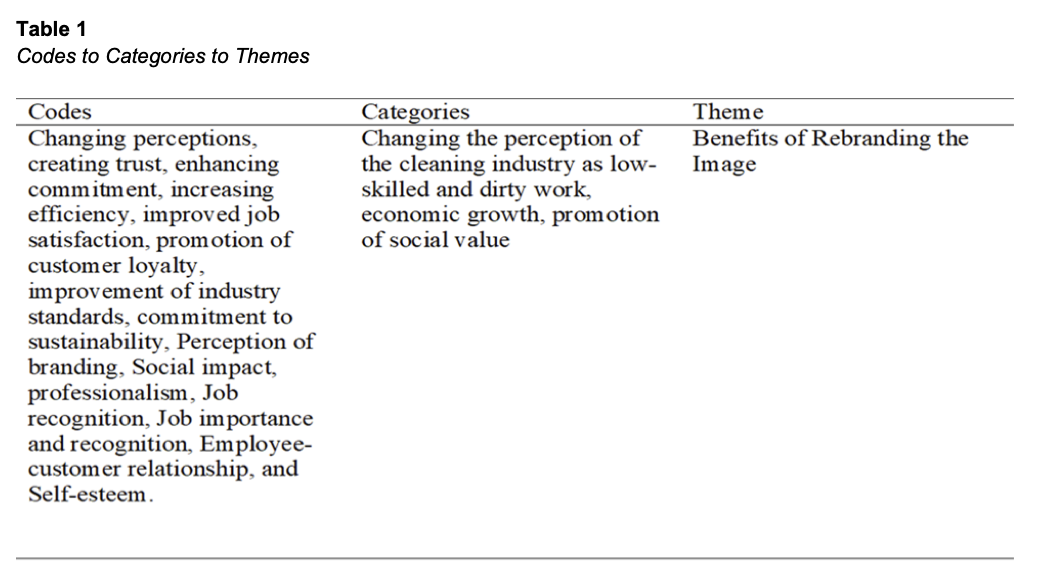
Theme 2: Perception of the Industry and Frontline Cleaners
Perceptions of the cleaning industry in the UK varied from one respondent to the other. While some respondents showed a positive attitude toward the industry, acknowledging the cleaning sector’s role in UK society, others showed negative stereotypes. Several categories were generated from the interview transcripts to help develop the second theme- perception of the industry and frontline cleaners. The following table shows how theme 2 was generated from related categories and the codes formed from the interview transcript.
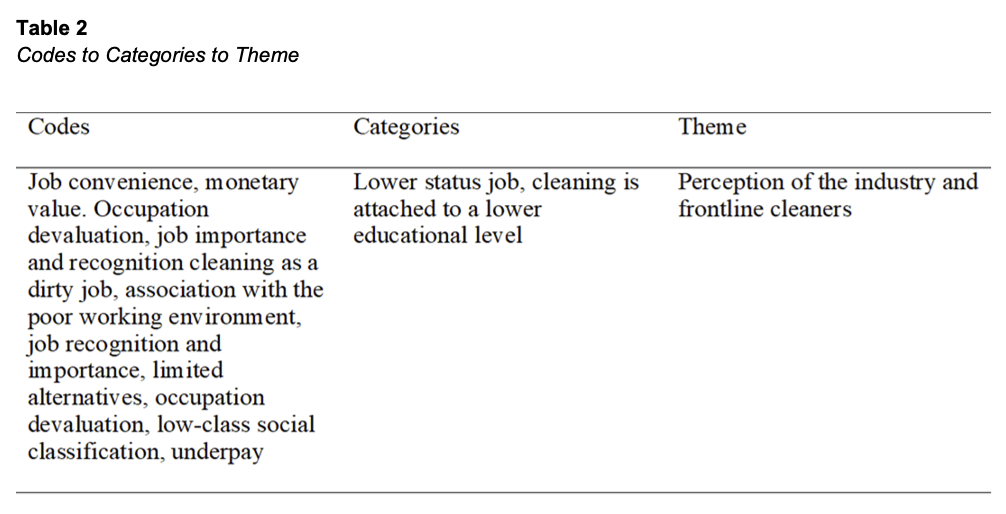
The respondents reveal positive attitudes about the cleaning industry, including job convenience and monetary value. As such, rebranding this industry image will significantly create more impact. Cleaning is flexible as an employee is not restricted to a particular working hour. Participant 1 said the cleaning job is particularly flexible for her as she is a family woman. “I started as a night cleaner because I had little children and can look after them during the day” (Participant 1). The flexibility of this role makes many employees feel comfortable, “…. And just the thought of cleaning made me feel that I will practice cleaning and perform better in my cleaning role and personal life” (Participant 1). Another positive perception of the cleaning job revealed from the interview is that it is attached to good monetary value. Participant 1 said, “I found it easy to be employed in this role as a cleaner; what attracted me was the money indeed.” Based on the interview responses, the payment method for the cleaning job is reliable. “….What made me attractive is the access to money you get paid easily (Participant 2). The rebranding will make the wages of a cleaning job to become similar and important to any other profession.
According to Participant 2 “When the money is coming to the bank is not to say that this is a cleaning money.”While few respondents shared their opinion on the positive nature of a cleaning job, many showed how this role is underrated within the UK society. Cleaners are not respected within society. Participant 2 stated, “They need to respect cleaners.” “….the name of the cleaning is dirty for them, most peoplearound70% perceived cleaning to be a dirty job.” The cleaning job is considered in the UK society as a dirty job and hence not respected. Participant 1 said “The role as a cleaner seemed like a dirty job. We are always looked down upon.” The responses help to acknowledge the need for rebranding and the effect it would bring to the entire industry.
Another negative perception of this industry is the stereotype that cleaning job is for illiterate people“. “Before I started this job we are seen as unskilled.” “….. “We are just not recognized” (Participant 1). People in society believe that those who go for cleaning jobs are unskilled and do not have options for better jobs”. And the question comes now, why do unintelligent people choose a cleaning job” (Participant 1). The respondent also revealed that the cleaning job is devalued because of their working environment, including toilets and accommodation rooms. As revealed in the following statement, some clients put pressure on cleaners, “their questions like “Why this place is not cleaned?”. Why are there, not enough toilet papers?” (Participant 1). The responses show that the cleaning industry is highly degraded and can only be improved through rebranding. “We’re going to consider ourselves a professional in the job we are doing. If this rebranding occurs, it will benefit for sure” (Participant 1).
Theme 3: Stigma Associated with Being a Cleaner
Unfortunately, this study revealed some stigma associated with being a cleaner in the UK sector. According to the interview responses, this stigma is usually rooted in societal biases and stereotypes concerning the nature of the cleaning role. The following categories and codes were generated from the interview responses and helped to develop theme 3-Stigma associated with being a cleaner.
Cleaners receive low social status from society, hence lacking self-esteem. The perception tends to stem from the historical events where the cleaning role was considered a form of slavery. Participant 1 said, “….and as far as I remember, house cleaners were slaves.” Cleaners believe rebranding the industry will help give them recognition and importance. Participant 1 explains that rebranding will give cleaners a higher status and self-esteem. The environment in which cleaners work adds much pressure and depression in their workplaces. In most cases, cleaners get much pressure from their clients even as they seek to satisfy them through quality work. “Their questions like why this place is not cleaned? Why are there, not enough toilet papers” (Participant 1). Working in a toilet environment is one of society’s most devalued roles. The response made by Participant 1 shows that the stigma experienced by most cleaners results from the poor job environment. Another significant effect of rebranding is associated with the purchase and improvement of cleaning equipment. Participant 3a said, “One of the equipments we use to clean is not efficient, and the number of people we are supposed to use to do the job is limited.” As a result of the workforce shortage, employees are forced to overwork as many people are not willing to do the roles.
Participant 1 stated, “……sometimes we are prone to burnout. And all these causes depression, anxiety, they all lead to mental problems.” Participant 3a also revealed that there is discrimination within the cleaning industry which could also be one of the causes of depression. “……because you’re not being treated fairly as a cleaner” (Participant 3a). The perception of gender roles within the UK society is also a possible cause of stigma. One respondent complained of cleaning men‘s toilets and being at risk of confrontation when performing the role. “I’m working in men’s toilet, then you are a lady you work in men’s toilets and the men are coming through and they don’t care about the female cleaner working inside these facilities (Participant 2). Based on the quoted responses, it is believed that cleaners are prone to suffer from depression hence the need for rebranding.
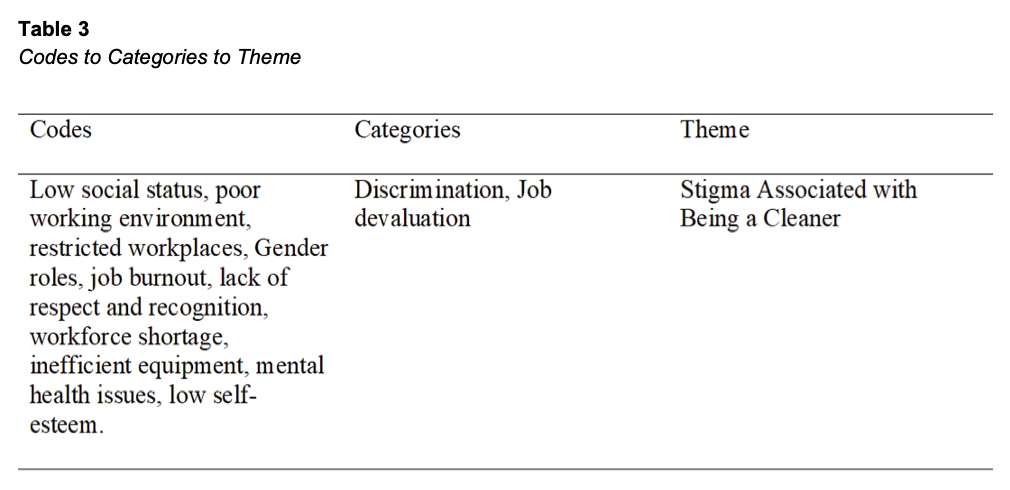
Theme 4: Government Intervention in Cleaning Industry
Rebranding of the UK cleaning industry should include government intervention which takes various forms to ensure the industry operates efficiently. The interviews generated several categories to show the need for government involvement in the cleaning industry to ensure a good image. The government can help change the industry’s image by ensuring equal job recognition, training, and certification programs and offering financial support. Several categories were identified from the interview responses and helped to generate the theme of government intervention in the cleaning industry.
The government of the UK does not consider the cleaning job as important as other professionals. The negligence of this industry seems to have contributed to the negative social perception of the cleaning sector. Participant 2 said, ” It means that the poor image of cleaning job is not a concern for the government….” The rebranding of the cleaning industry must include the government’s involvement where all occupations are seen as equal. The government’s involvement in this initiative adds economic value to the public. Participant 1 states, “…. then the government by employing many cleaners to retain more taxes.” The government can help fix several issues needed in the branding initiative, such as certification of the training programs and ensuring environmental regulation. Participant 2 said, “…. give more training to the employee they employ.” The government can attract more cleaning sector investors by creating a good working environment with favorable laws. The government should recognize branding for the cleaners to earn the required respect. “…..if the cleaning profession is being governed by the constitution or a law, people are going to respect it” (Respondent 3b). Generally, the rebranding of the cleaning industry should adhere to the government’s status.
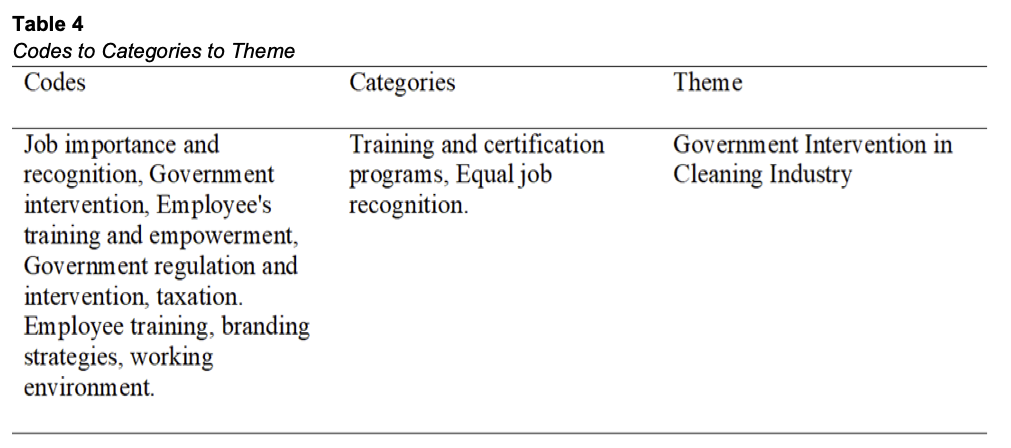
Theme 5: Sustainable Practices in the UK Cleaning Industry
Cleaning industries in the UK recognize the importance of evaluating sustainable practices that facilitate the rebranding of cleaning images and perceptions. This theme focuses on two essential categories: environmentally friendly cleaning methods and waste reduction and recycling initiatives that seek to answer research question two.
By embracing eco-friendly cleaning methods like non-toxic products and energy-efficient techniques, the industry can demonstrate its commitment to sustainability and improve its perception. Similarly, the sector minimizes its environmental impact by implementing initiatives to reduce waste and promote recycling. Four participants argued that recognizing sustainable practices in the UK cleaning industry is crucial in rebranding the image.
Eco-friendly cleaning methods promote sustainability in the UK cleaning industry. Participant 3 highlighted that hygiene is crucial for the industry’s survival. The participant also stated that a lack of hygiene could lead to the closure of cleaning businesses by indicating: “…cleaning is just maintaining hygiene. So, if there is no hygiene, that means the environment or the industry is going to close down.” Participant 3 emphasized the significance of cleanliness in maintaining a positive image and perception of the industry. By using non-toxic products and energy-efficient techniques, the industry can ensure that cleanliness is achieved without causing harm to the environment.
Participant 7 addressed the role of a cleaner being mainly involves sanitation, which contributes to maintaining an eco-friendly environment, by stating: “As a cleaner, what we basically do is called sanitation by maintaining an eco-friendly environment”. The participant understood the connection between cleaning practices and environmental sustainability. By emphasizing the role of sanitation in eco-friendliness, participant 7 highlighted the potential positive impact of adopting eco-friendly cleaning methods on the industry’s image and perception. The participant indicated that the UK cleaning industry can use existing facilities and resources, such as train stations or office spaces, to maintain a clean environment. This initiative benefits the customers by providing them with a clean and pleasant environment and contributes to their overall satisfaction. Participant 1 mentioned the benefits of recruiting more cleaners as a waste reduction initiative by indicating it will generate more taxes leading to economic benefits. Additionally, the participant emphasized that maintaining a clean, organized, and hygienic environment is essential for customers and the wider society.

Discussions
Most interview respondents believed rebranding the UK cleaning industry would bring significant societal changes. According to the responses, both negative and positive effects can be realized through the rebranding of this industry. Similarly, International Labor Organization, (2023) and British Cleaning Council (2021) posit the cleaning industry often faces low-skilled labor and pay issues. Another study by Iglesias et al. (2019) supports the results gained from this study stating that the cleaning industry has improved public perception and increased trust in different industries. Therefore, rebranding the image of the cleaning industry will accrue several benefits, including changing the negative social perception of cleaners. Based on most participants’ responses, rebranding the cleaning industry would attract more customers, increasing the business opportunity for this sector. This attitude relates to Verčič (2021) who mentioned that rebranding could emphasize professionalism and reliability, attracting many people and changing their negative perceptions. Like the participant’s views collected during the interview, rebranding can help position the cleaning services as valuable and essential by changing societal attitudes (Bonotto, 2019).
As revealed from the interview responses, the perception of the cleaning industry and frontline cleaners greatly affects the UK’s cleaning industry. Societal stereotypes and misconceptions always influence the different attitudes among people. For example, Participant 2 noted that cleaners have low education levels. Rebranding efforts can play an essential role in changing these perceptions (Ahmad & Worlu, 2019; Sykes et al., 2014). This intervention can highlight the importance and impact of cleaning services, shifting this industry’s narrative from menial work to a vital profession. Rebranding can help emphasize frontline cleaners’ skills and hard work (Amit, 2022). Participant 1 mentioned that one of the challenges they faced at the workplace was a shortage and ineffective equipment. As such, rebranding will serve a crucial role as the cleaners can have an opportunity to showcase their expertise in using advanced cleaning techniques and equipment to deliver quality work (Insureon Staff, 2022).
This initiative can help combat the perception that it is low-skilled work. As noted by Willis (2023), rebranding will create awareness about the specialized skills and training needed for an effective cleaning job. Furthermore, rebranding serves as one of the most effective interventions to help challenge the negative societal attitudes toward cleaners and reduce the stigma associated with the cleaning industry. Following the participant’s views, emphasizing the importance of cleaning for public health and well-being will reshape the public’s attitude toward cleaners. Iglesias et al. (2019) show that rebranding promotes the idea that the cleaning role is essential in our society. By emphasizing the positive impact of cleaners, whether in offices or any public space, there will be a significant shift in the public perspective and acknowledgment of the role of the cleaning industry.
Martínez and Jo McBride (2020) argue that addressing the stigma associated with cleaners requires more comprehensive societal changes. Some existing societal stereotypes must be changed to promote respect for all types of work and ensure equality and dignity in different roles. Government interventions are one of the factors affecting the cleaning industry in the UK. In view of the participant’s opinions, Winters and Jones (2021) mentioned that rebranding the cleaning industry may rely on government intervention and support in various ways, such as setting regulations. The UK government can regulate the industry by setting standards and promoting fair labor practices. However, participant 2 mentioned that the government does not recognize cleaning as a profession. Martínez and Jo McBride (2020) support that rebranding can foster the implementation of policies that promote fair wages, a safe working environment, and training opportunities, as emphasized by some interview participants.
The UK government can support rebranding through public awareness campaigns, improving the overall perception of the cleaning industry. The industry is essential in maintaining cleanliness and hygiene in various sectors of society, including healthcare facilities, commercial buildings, and public spaces. As sustainability grows, examining and promoting sustainable practices within the UK cleaning industry becomes imperative.
One approach to promoting sustainable practices in the UK cleaning industry is collaborating with various stakeholders. External influences like central and local governments shape industry standards and regulations. Bugg (2022) indicated that by recognizing the environmental impact of cleaning activities, governments could provide support and incentives for adopting sustainable cleaning practices. Chen (2018) suggested that initiatives like promoting green certifications for cleaning companies can also enhance the adoption of sustainable cleaning practices.
Conclusion and Recommendations
This study explored the effects of cleaning image perception and rebranding in the UK cleaning industry. Numerous kinds of literature were critically examined in a bid to obtain a theoretical understanding of the problems facing the study. The outcome following the review of the literature suggested several causes and effects of cleaning image perception and rebranding. This includes stigmatization, lack of status, and recognition by both employers and the government. The researcher explored a conceptual framework for cleaning image rebranding in a bid to advance solutions to addressing the stigma attached to the cleaning profession. It consisted of internal and external influential roles the industry employers and leaders, professional bodies, financial institutions, and local and central governments can play to elevate the cleaning image for it to become attractive and reputable. The empirical study outcome was consistent with the body of literature. It is therefore highly recommended that industry employers, the government, and professional bodies adopt a unified approach and policies that will enhance the redemption of the cleaning image and stigma. This initiative will help remarket the stigmatized image and brand of the cleaning profession that will attract and retain people to pursue a career, which will add value to the overall cleaning industry image.
Bibliography (standard format of citations according to international standards):
Ahmad, R., & Worlu, O. (2019). Does rebranding as name change rebuild or destroy brand equity (customer loyalty and brand reputation) after brand crisis?The case of Malaysian Airline System (MAS). Journal of Technology Management and Business, 6(2). https://publisher.uthm.edu.my/ojs/index.php/jtmb/article/view/2973
Amit, K. (2022). Employee as a tool for brand image creation a study (Paperback). Quail Ridge Books.
Beise-Zee, R. (2022). Brand equity retention after rebranding: a resource-based perspective. Journal of Brand Management, 29(2), 208-224. https://doi.org/10.1057/s41262-021-00263-5
Bettenhausen, C. A. (2022). COVID-19 clean is the new clean. The cleaning product industry expects intense cleaning to be a long-term habit. Chemical & Engineering News, 100(3) 22-23.https://pesquisa.bvsalud.org/global-literature-on-novel-coronavirus-2019-ncov/resource/pt/covidwho-1668401
Bonotto, C. (2019). Rebranding in service companies a&o Hostels case. Dissertation: Università Ca’ Foscari Venezia.http://hdl.handle.net/10579/14324
Braun, V., & Clarke, V. (2006). Using thematic analysis in psychology. Qualitative Research in Psychology, 3(2), 77-101. doi.org/10.1191/1478088706qp063oa
British Cleaning Council, (2021, November 09). UK cleaning industry statistics 2021. The cleaning and support services industry: Research Report 2021. https://www.policybee.co.uk/blog/uk-cleaning-industry-statistics-2021
Bryman, A. (2016). Social Research Methods. Oxford University Press.
Bugg, P. (2022, October 25). Cleaning Matters Magazine – changing perceptions of contract cleaning.
Cleaning Matters. Retrieved April 29, 2023, from https://www.cleaning-matters.co.uk/page_1242124.asp
Chen, L.F. (2018). Green certification, e-commerce, and low-carbon economy for international tourist hotels. Environmental Science and Pollution Research, 26(18), 17965–17973. https://doi.org/10.1007/s11356-018-2161-5
Hatton, E. (2017, January 17). Mechanisms of invisibility: rethinking the concept of invisible work. https://journals.sagepub.com/doi/10.1177/0950017016674894. Retrieved April 29, 2023, from https://www.jstor.org/stable/26500194
Iglesias, O., Markovic, S., Singh, J. J., & Sierra, V. (2019). Do customer perceptions of corporate services brand ethicality improve brand equity? Considering the roles of brand heritage, brand image, and recognition benefits. Journal of Business Ethics, 154, 441-459. https://doi.org/10.1007/s10551-017-3455-0
Insureon Staff, (2022, August 1). How to get more clients for your cleaning business. Insureon. https://www.insureon.com/blog/how-to-get-more-clients-for-your-cleaning-business
International Labour Organization, (2023). Domestic workers. Chapter 8: Minimum wages for domestic workers: Why domestic workers’ wages are often very low. International Labour Organization (ILO). https://www.ilo.org/global/topics/wages/minimum-wages/domestic-workers/WCMS_438267/lang–en/index.htm
Lester, J. N., Cho, Y., & Lochmiller, C. R. (2020). Learning to do qualitative data analysis: A starting point. Human Resource Development Review, 19(1), 94–106. doi.org/10.1177/1534484320903890
Lochmiller, C. (2021). Conducting thematic analysis with qualitative data. The Qualitative Report,26(6), 2029–2044. https://doi.org/10.46743/2160-3715/2021.5008
Lowe, G. (2020). Creating healthy organizations: Taking action to improve employee well-being, revised and expanded edition. University of Toronto Press.
Lucio, M. M., & McBride, J. (2020, June 10). All posts. Policy Manchester Articles. https://blog.policy.manchester.ac.uk/posts/2020/06/recognising-the-value-and-significance-of-cleaning-work-in-a-context-of-crisis/
Martínez, M L., & Jo McBride, (2020, June 10) Recognizing the value and significance of cleaning work in a context of crisis. The University of Manchester. https://blog.policy.manchester.ac.uk/posts/2020/06/recognising-the-value-and-significance-of-cleaning-work-in-a-context-of-crisis/#:~:text=Stigma%20and%20the%20feeling%20of,being%20done%20is%20’unimportant’
NHS Mortgage Guide 10 amazing tips for NHS mortgages. NHS Mortgages. (2023, February 13). https://nhs-mortgages.co.uk/nhs-mortgage/mortgages-for-nhs-staff/#:~:text=Do%20NHS%20Staff%20Get%20Mortgage,of%20discount%20on%20their%20mortgage
Quang Jr, H. (2022). The effects of rebranding on customer’s perspective. Dissertation; South-Eastern Finland University of Applied Sciences
Rabelo, V. C., & Mahalingam, R. (2018). “they really don’t want to see us”: How cleaners experience invisible ‘dirty’ work. Journal of Vocational Behavior, 113, 103–114. https://doi.org/10.1016/j.jvb.2018.10.010
Richard Branson quotes on employees, Work & Life. Overall Motivation. (2020, April 10). https://www.overallmotivation.com/quotes/richard-branson-quotes-employees-work-life/
Sykes, W., Groom, C., Desai, P., & Kelly, J. (2014). Coming clean: The experience of cleaning operatives. The Invisible Workforce: Employment practices in the cleaning sector findings report. Equality and Human Rights Commission
Sykes, W., Groom, C., Desai, P., & Kelly, J. (2014). Coming clean: The experience of cleaning operatives. The Invisible Workforce: Employment practices in the cleaning sector findings report. Equality and Human Rights Commission
Tansley, E. (2021, January 27). Group calls for key worker status and vaccines for cleaners. TWinFM. Retrieved April 22, 2023, from https://www.twinfm.com/article/parliamentary-group-calls-for-key-worker-status-and-vaccines-for-cleaners
Verčič, A. T. (2021). The impact of employee engagement, organizational support and employer branding on internal communication satisfaction. Public Relations Review, 47(1), 102009. https://doi.org/10.1016/j.pubrev.2021.102009
Willis., N., (2023). How to start a cleaning business and earn straight away. Skint Dad. https://skintdad.co.uk/how-to-start-a-cleaning-business-uk/#:~:text=If%20you%20have%20a%20strong,your%20own%20domestic%20cleaning%20business.
Winters., G., & Jones., K. (2021). British cleaning council: The cleaning, hygiene and waste industry. Industry Trends Report 2021. https://www.bics.org.uk/wp-content/uploads/2021/06/RR2021.pdf
Zambas , J. (2023, March 9). The 30 worst jobs in the world. CareerAddict. Retrieved April 23, 2023, from https://www.careeraddict.com/worst-jobs
Author: Eghosa Edo Fred Idehen, student LIGS University
Approved by: Dr Minh Nguyen, lecturer LIGS University



